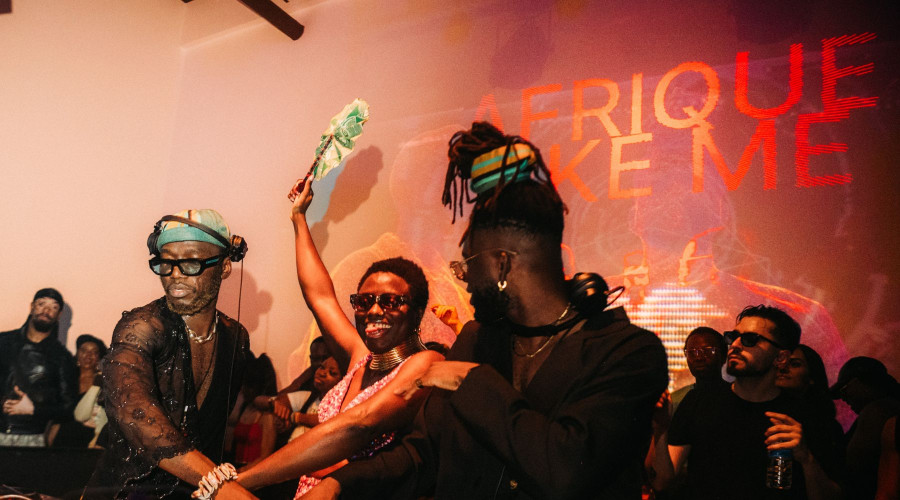Techno, well known to have German influence, was also a word attributed to a form of EDM music coming out of Detroit in the the 1980s. Detroit techno came from blending funk, electro and house music which all have Black roots. House specifically came from Chicago club culture in the 1980s primarily orchestrated by Black gay men and the DJs and music producers curating unforgettable parties that celebrated their community.
There is evidence of sub-genre Afro-House as early as the 1990s in Angola before the South African label House Afrika was established in 1994. Since then, the sub-genre has grown and become popularized by South-African artist Black Coffee and others through to the 2010s. The 2020s saw the UK form its first Afro-House label, Sondela, as the movement expanded outside of Africa.
In Canada, the group Afrique Like Me, founded in 2019, recently celebrated five years of musical innovation. Comprising Razaq El Toro, Martin Ses, and Sonic Griot, the trio initially made waves by DJing after-hours parties before taking the stage at prominent events like Electric Island. Afrique Like Me has quickly become a leading name in the Canadian Afro-House scene.
{https://www.instagram.com/p/DD-NcYNSDli/?hl=en}
Razaq and Martin first connected at an event hosted by Afro Haus TO, sparking discussions about collaborating on DJ events. After witnessing Martin's debut performance, Razaq recognized the potential for a successful partnership. However, he felt the collective needed a third member.
Meanwhile, Sonic Griot was simultaneously carving out her own niche in the scene. Razaq recalls the moment he invited her to join, humorously noting the nervousness that came with the call. Sonic Griot , however, recounts the invitation as a straightforward proposal rather than a request, expressing her honour at being asked to join. “I told him I didn’t know how to DJ, and he said I’d figure it out. And I did,” she chuckles.
Razaq tells us that all three members had an electronic music background and listened to a lot of house music before founding Afrique Like Me. He adds that Afrique Like Me was born out of a need for representation. “We would go out dancing to that electronic music, but we weren't seeing a lot of representation in those spaces. A big part of the inception of Afrique Like Me was trying to create a space where we can celebrate that sound but infuse our culture into it and actually represent who we are and be who we are.”
Sonic Griot says the rise of Afro House is also due to it being “good, pure music.” She adds that her childhood was filled with Afro-Diaspora and African music, and her experiences living in South Africa deepened her connection to Afro-House. She recalls a pivotal moment when she saw a Kenyan DJ, Coco M, perform, feeling a surge of empowerment from witnessing representation in the music she loved.
“I just remember being like, ‘Oh my gosh, she's like a dark-skinned woman, who lives in and was born in Africa, who's playing this insane music that I really love. If she can do it, I can too’. That was where I realized that representation is super important because I'd always listened to House, but I just had never seen someone who looked like me playing house music.”
As Afrique Like Me continues to evolve, they believe they remain one of the few Black-led independent DJ trios in Toronto. Their distinct approach has drawn inspiration from global scenes in Kenya, the USA, and Berlin, enhancing their unique sound.
The trio's journey gained momentum as COVID-19 restrictions eased. What began as a modest buzz transformed into a significant opportunity when they were invited to headline Subdivision, a Toronto club. This led to a regular Thursday night residency, where they showcased their innovative performance style as a cohesive trio. Their recent five-year anniversary party at Mooi attracted 500 attendees, solidifying their standing in the local music scene.
{https://www.instagram.com/p/DDunnwEyXTL/?hl=en}
Bianca Garcia, among those celebrating at Mooi, shared her own experiences with house music rooted in her Dominican heritage. "Given the large African influence in Latin American culture, it's no surprise that Afro-inspired music is present in the region," she notes, recalling her time in Brazil where she fell in love with Afro-Brazilian house music. Bianca observes that while the Afro-House sub-genre has been growing, its visibility varies by location and community. "It's exciting to see it getting the recognition it deserves," she concludes, highlighting the increasing accessibility of Afro-House in cities like Toronto.
As Afrique Like Me continues to carve out its place in the music scene, Razaq El Toro reflects on the challenges Black musicians face in an industry often perceived as gatekept. “It feels clique-y,” he remarks, noting that breaking into the scene frequently hinges on connections. “If you're not in with the right folks, you may not necessarily get a shot.”
Sonic Griot echoes these sentiments, highlighting a troubling trend she’s observed beyond Toronto: a tension surrounding the production of Afro-House music by non-African artists. “It’s not to say that influence is unwelcome, but a crucial conversation often overlooked is how we create space for African artists to make music, secure bookings, and travel internationally,” she explains. The reality is stark: many prominent African Afro-House producers struggle to obtain visas, complicating their opportunities for touring and exposure. “There are structural inequities that make it challenging,” Sonic Griot adds.
Determined to challenge these barriers, Afrique Like Me is committed to fostering an inclusive environment for emerging artists. Sonic Griot is actively involved in this mission, serving on the JUNO Awards Underground Dance Single Committee. “Having a seat at the table is crucial for representation within music institutions,” she asserts. An important part of this work involves educating audiences on the diversity of African sounds and artists. “Just as African people are not a monolith, neither are the genres and sounds emerging from African and diasporic artists. Each style deserves recognition and appreciation for its uniqueness.”
With Afro-House gaining momentum in Toronto, Sonic Griot acknowledges the vital support from organizations like Ontario Creates and the Toronto Arts Council. “Their commitment to funding underrepresented communities has been paramount. The access to capital has allowed us to dream.”
Afrique Like Me is not just dreaming; they are actively putting Afro-House on the map in Canada, thirty years after the sub-genre's inception. Through their efforts, they are not only increasing visibility for Afro-House but also paving the way for future generations of artists to thrive in a more equitable music landscape.

 By
By 


